- Home
- Kim Newman
Anno Dracula 1899 and Other Stories Page 5
Anno Dracula 1899 and Other Stories Read online
Page 5
Mr Enfield looked at me. He took another drink.
‘You really don’t know Leo Dare, do you?’
At that moment, I was distracted.
In the street, ten or fifteen new devotees of the Jekyll Tonic were changing. It was like a Court of Miracles from Notre Dame de Paris crossed with the news of the Relief of Mafeking. Crutches thrown away! Speaking in tongues! Vigorous embraces! Cries for more, more, more! Supply at the stall was exhausted, and the sales girls apologised. Banknotes were waved in fists. Coins were thrown. One girl nearly had her eye put out by a flung florin.
The police moved in, augmenting our bare-knuckle men.
I saw the most beautiful woman I ever beheld in my life, a slim blonde angel wrapped in the voluminous garments of a much, much larger lady. She threw away a veiled hat, to unloose a stream of glamorous golden hair. She took my arm and looked at me with unutterably lovely eyes.
‘The children call me “pig-face”,’ she said, wondering.
I did not understand.
‘A mirror,’ she said. ‘Have you a mirror?’
I patted my pockets though I knew I did not have a glass about me. At my shrug of apology, she left me – a slave to her memory – to ask another bystander.
Beyond the crowd, I saw Varrable having heated words with Leo Dare. The chemist listened, arms folded, as Leo Dare stabbed the air with a cigar to emphasise points.
The transformed angel found a mirror and was stunned by her new face, a female Narcissus absolutely smitten with herself.
The mirror was passed around. Our customers beheld their fresh selves. I heard a scream from one, who covered his head with his jacket and plunged alarmingly through the crowd. He was soon forgotten. Others danced on the cobbles, leapt up and down with abandon, shouted ‘Look at me!’, performed feats of strength such as lifting a grown man up in each hand, turning cartwheels. A ragged choir lit into ‘An Inspirational Transformational Super-Sensational Stuff’.
Word escaped that I was connected with the consortium, and I was hugged and kissed. I trapped light fingers reaching for my wallet and watch, and kicked away a junior ruffian who scurried off with good humour to ply his trade elsewhere.
Leo Dare and Varrable caught the ear of Sir Marmaduke. He stood up on a platform by the stall.
‘Friends, friends,’ announced Sir Marmaduke, booming at the crowd with a voice proved in parliamentary debate. ‘Owing to the unprecedented demand, a fresh batch of the wonder Tonic is being brewed up even as we speak. It will take some hours for the complex scientifical processes necessary in its manufacture to be brought to complete fruition, but on behalf of the Jekyll Tonic consortium we pledge that the demand shall be met even if it means working our factory round the clock. The Jekyll will be on sale again by twelve noon, this we guarantee.’
‘Maybe they still got some at Filkins the Chemist, down the road,’ suggested someone.
Half the crowd dashed off.
They soon came back. It had been the same at Filkins the Chemist, and at shops all over London.
The Jekyll Tonic had not so much arrived as exploded.
* * *
The papers were full of it. Questions were asked in the House (and answered at length by a personage familiar to us all). More vats were bought and more fellows engaged to stir the compounds. Our credit was accepted by suppliers of equipment and chemicals. Carts continued to trundle out three times a day, laden with cases of the Jekyll Tonic. The former stables grew more crowded and we had to lease larger premises adjoining the original site. In addition to the vat-stirrers, we had (after unfortunate incidents) to engage more bruisers to watch that the workers didn’t siphon off or sample the raw Tonic. Then we had to take on ex-soldiers and former policemen to crack down on the bruisers.
It turned out that there had been a deal of pilferage, and ‘super-strength’ Jekyll Tonic was being made available to the criminal classes of Whitechapel, Limehouse and Wapping. Inspector Mist snuffled around again, with reports of running battles in the streets between Irish and Hebrew bully-boys with illicit Jekyll interests and the Chinese tongs who found patronage of their opium dens drastically reduced. Leo Dare was not overly concerned, assuring us all that this had been accounted for in his calculations. It would only serve to sharpen the appetite for our legitimate Tonic. All considered, that a street brawler of previously average reputation could see off a dozen Chinamen though one of the Celestials had embedded a hatchet in his skull was as fine a testimony for us as any recommendation from a bishop or baronet. We did, however, bring swift and merciless court actions against competitors who ventured to sell coloured tincture of laudanum as ‘Jeckell Tonik’ or ‘Jickle Juice’. I made sure to add to all our posters the rubric ‘Accept no imitations, swallow no substitute… there is only one original Jekyll Tonic!’
Borrowing against my stock, I removed myself from lodgings in Lewisham to a house in Kensington. Suddenly equipped with (or weighed down by) the trappings of a man of stature. I had to beseech from Sir Marmaduke and Lady Knowe information about how best to employ a household’s worth of bowers and scrapers. It took me a disastrous week to learn that the finest servants were not necessarily the most unctuously deferential butlers or the prettiest, cheekiest maids but rather the faintly drab individuals who actually took the bother to do the work they were paid for. I received so many invitations that I had to engage a secretary with a typewriter to respond to them all. I did not let it go to my head. It was all very well to be popular and sought-after, but it was what was on deposit at Coutts that counted.
Varrable, the last man I should have thought likely to gain a reputation as a rakehell, was seen about town with, in succession, a chorus girl with a dimple, a Drury Lane ornament whose beauty had prompted several duels in Paris, the wealthy young widow of a lately deceased African millionaire and the youngest daughter of a duke. Sir Marmaduke was offered a cabinet position, but declined on the grounds that his business interests engaged too much of his time for him to be concerned with the minutiae of canals and waterways. Lady Knowe took tea with the Prince and Princess of Wales, dressed in white for the first time in her life in honour of the occasion. Her philanthropic concerns became extremely fashionable, and many distinguished names were added to her roster of charitable souls. Mr Enfield sold all his stock (mostly, through third parties, to me) and departed for the South Seas, still muttering doom under his breath. He was fleeing from a fortune but would not be reasoned with, and if profit was to be had from his squeamishness I saw no reason why I should not be the one to scoop it.
For me personally, Jekyll Tonic was Inspirational, Transformational and Super-Sensational. And I did not even taste the stuff.
At some point in any venture, my job changes from ‘starting up’ to ‘looking after’. Once the train is up to full steam, it needs a steady hand on the throttle and a good eye on the track ahead. There is no time to relax, to sit back and let the coffers fill. Each day brought a thousand questions from the press, from tradesmen, from the factory. My secretary wore out her typewriter, and a new, improved model had to be purchased. I arranged tours of inspection, interviews with various members of the consortium (never Leo Dare, of course), supervised the design of new and improved labels for the bottles. I no longer had a fresh canvas: the name of Jekyll Tonic was known, and had to be protected rather than bruited about. That was the chief reason for seeing off the Jickle and Jeckell jokesters.
All at once, we were the only Tonic. Bovril was forgotten, even when advertised by an admirable image of a cow being strapped into an electric chair. Carter’s Little Liver Pills piled up unsold in the stores. Dentists reported that even heroin, miracle drug of the decade, was sorely out of fashion. Sufferers from all maladies and pains demanded to go ‘on the Jekyll’ and would accept no substitutes.
* * *
By now, a week into the reign of the Tonic, I was surprised by nothing. Approaching Varrable’s office early in the morning, I passed a lady who had just emerged from our
chemist’s sanctum. Though her hair and costume were in disarray, I recognised Mrs Mary Biddlesham, a supporter of Lady Knowe’s latest endeavour, to ship supplies of the Jekyll overseas to missionaries in order to coax out the decent Christian lurking within every benighted heathen. Mrs Biddlesham repaired her clothing in a manner that led me to form a conclusion as to the activities with which she had been engaged overnight. She did not meet my eye or answer my good-day.
I found Varrable fussing with his cravat, admiring himself in the cheval glass, and in good spirits.
‘You are a wonder,’ I said.
Varrable smiled and paraphrased one of my slogans. ‘Inside every kitten, there’s a tiger!’
I shrugged.
‘With claws, Billy,’ he assured me. ‘I have the scratches to prove it.’
A divan had been installed in Varrable’s office, as an aid to abstract thought. Its cushions were on the floor and I gathered that little in the abstract had transpired on the previous evening.
The remains of a late supper stood on a side table.
I picked up an empty glass, and sniffed the dregs.
Varrable raised a decanter.
‘It looks like port, remember,’ he said.
‘Doc, you’ve become a blackguard.’
‘Have I not? I don’t know about the average advertising man, but the average research chemist isn’t thought of as a “catch” by the ladies. It’s something to do with the penury and long hours, of course, but the reason most often given is the smell. At school, they call chemistry “stinks”. It stays with you for life. Not so stinky now, of course.’
He sniffed his newly manicured nails.
‘I don’t go near the vats any more,’ he said. ‘We have low people for that.’
‘So this is your secret?’
‘It’s all our secret, isn’t it? I confess I’ve been conducting my own course of private experiments. I should write it up, I suppose. “The Effects of Dr Henry Jekyll’s Transformational Formula Upon the Fairer Sex, as Observed Firsthand by Dr Hugo Varrable, with Fifteen Watercolour Plates and Extensive Footnotes”. At first, I propose a toast and we both “take a Jekyll”, only mine is coloured water. An observer has to be distanced. I admit that I do tend to intervene, possibly affecting the outcome of the experiments. A certain, ah, class of female is excited by the prospect, and will probably deliver the desired results with a placebo of coloured water. But my interests in that sort ran dry some time ago. Their inner selves are too close to the skin. No, to demonstrate the truly miraculous effects of the Tonic, I have to seek not Rosie O’Grady but the Colonel’s Lady. In this case, the Commodore’s Lady.’
‘What if they’re like us, Doc? What if they don’t want to find out what’s inside or know already? A lot of people are still afraid of the Jekyll.’
Varrable laughed.
‘Don’t I know it, Billy! Mrs Biddlesham, for one. In her case, I simply gave her an aperitif with the complements of your Hibernian friend, Mr Michael Finn.’
‘The results?’
‘Most satisfactory. I’m not the only researcher in this field. A great many gentlemen have been purchasing the Tonic not for themselves, but for ladies of their glancing acquaintance. Sir Marmaduke insists his household take a tablespoon a day. He lines up his maidservants like sailors being given the rum ration. And he’s been rejuvenating himself with regular doses. I understand a few women of dubious character or attractions have ventured their own experiments along these lines. I couldn’t approve of that, of course.’
I was not, of course, shocked. But I did perceive a flutter of danger.
‘When your, ah, lady-friends, come to themselves, how do they feel?’
‘Delighted and rotten all at the same time, I should imagine. I’ve never really asked. Do you think I should make inquiries? Do a “follow-up” study?’
I thought a moment. There would be complaints. It was but a matter of time before some soiled dove took the matter to the police. No lady of good name would want this to come out in the courts, but eventually some tart with nothing to lose would try it on. And I would not have wanted to be in Varrable’s expensive new shoes if word of last night’s experiment were to reach Commodore Biddlesham, whose expertise with both cutlass and revolver could be attested to by not a few deceased Shanghai river pirates.
‘You still don’t use the Jekyll?’ I asked. ‘I mean, Doc, this is you?’
He looked surprised at the question, but insisted he’d never touched a drop.
Still, even without drinking it, the Tonic had brought out something inside him that would never go back in hiding.
‘Tonight, a fresh direction,’ he said, sliding on his smart new jacket. ‘I am entertaining the Flavering Sisters, Flora and Belinda. Their father, the Earl of Roscommon, sits on the board of the University of… well, you know who he is. A year ago, Billy, I was discharged from the faculty. Merely for pursuing a line of inquiry involving the effects of caustic solutions upon the mammalian eye. A petition was got up about vivisection and a to-do burst in the papers. My name was “Mudd”, like your countryman, Dr Samuel Mudd. Now it might as well be “Rose”, for it seems that with the Jekyll Tonic millions pouring in I smell a lot sweeter. This is the Strange Case of Dr Varrable… and Mr Rose.’
‘Flora and Belinda,’ I mused. ‘With which delightful young lady do you intend to experiment?’
Varrable fixed a fresh-cut rose to his lapel, and sniffed it.
‘You misjudge me. Why choose only one?’
* * *
‘You’ve complicated our lives at the Yard, sir. And no mistake.’
Inspector Mist had become a frequent visitor to Shoreditch.
Given that with the Jekyll craze, all I saw were smiling faces, hungry eyes, beautiful women, happy bankers, deferential servants and ecstatic consortium comrades, the presence of the Inspector, who trudged about under a perpetual black cloud, was almost a refreshing change. In a world of sunshine and champagne, he brought his own little patch of gloom and weak tea.
‘One swig and you change face, body, height, everything. Don’t match a description. Don’t look like your picture in the Police Gazette.’
‘You mean the Threadneedle Street bandits?’
‘Indeed. A touch of your “Wild Wicked West” in staid old foggy London. There were heart attacks, you know.’
‘So I read.’
A small band of habitual crooks, minor rogues who had never done anything worse than lift a purse or knock over a costermonger, had staged a raid on the Bank of England after the manner of Jesse James. They careened up Threadneedle Street on horses and in a carriage, discharged revolvers at random over the heads of shocked crowds and dashed into the august financial establishment, demanding that cash and bullion be handed over. Before setting out on this exploit, each of the gang had drained a bottle of Jekyll to become another person entirely. It was popularly supposed that the transformed criminals were ape-faced, spider-fingered, devil-horned, cyclops-eyed sub-human fiends. The Pall Mall Gazette, perhaps inevitably, had referred to the miscreants as ‘a pack of Hydes’. I had already dashed off a telegram to the editor threatening withdrawal of advertising unless a balanced retraction appeared within the week.
‘Suppose it’s a mercy your average villain is so thick-headed,’ said the Inspector. ‘This mob had spent all their lives dreaming about robbing the Bank of England. It was the Land of Cockaigne to them, sir. They thought of a golden temple. Heaps of banknotes and piles of silver sovereigns lying around for the taking. Then they crashed in and discovered it was a bank like any other, only snootier. Vaults and strong-boxes, inaccessible to the raiders. When we caught up with them, they had less loot to hand than you’d expect from a provincial post office job. All themselves again, they were, blinking and surprised. Hadn’t taken elementary precautions. Got ’em by the mud on their boots. And the blood on their coats.’
Two bank employees had been ‘pistol-whipped’. One seemed likely to die.
&nb
sp; ‘Still, a question is answered. One left over from the Hyde business.’
‘What question, Inspector?’
‘It’s like this, sir. We knew what happened when Jekyll drank. He became Hyde. But, even without the potion, there are Hydes in the world. See ’em every day. Not a few on the force, in fact. Now we know what happens when Hyde drinks. It doesn’t make him cleverer, which is a terror and yet a mercy. A terror because all trace of scruple, even that which rises from fear of being caught, evaporates like dew in the morning. But a mercy because your Hyde is a stupid crook. And stupid crooks are easy to catch. But not all villains are idiots, Mr Quinn. Jekyll was a villain, after all. He was different from Hyde, not separate. What mightn’t happen if a clever villain drinks your Tonic. What then, sir?’
I had the uncomfortable sensation that I was being judged.
‘It’s just patent medicine, Inspector,’ I said. ‘It doesn’t really do anything, except in the imagination. Oh, it’s dramatic, all right. Makes people pull faces. But it wears off in a tick, and you’re back for another bottle. There’s nothing inherently evil about the stuff. Have you tried it?’
‘Yes, sir. Have you?’
Not loitering for an answer, Mist left.
* * *
Jekyll Tonic had been on sale for two weeks. I was returning to Kensington just after dawn. The sun was up but the thin fog had yet to dissipate. This was not the fabled pea-souper I’d heard about back in the States, just wispy yellowish stuff that hung in the air like the colour swirls in a glass marble. I trailed my stylish new cane through some strands, setting them in motion like phantom streamers.
I was still a little ‘tight’ from last night’s celebration, hosted after the show at the Tivoli by Harry ‘Brass’ Button, in honour of the success of our venture. The entire company of the music hall had been in attendance, and most of the finest, most fashionable in the city. Not to mention the Flavering Sisters – quite the Jekyll fiends these days, with happy results for Varrable that he was generous enough to share with his comrades in the consortium. Even Lady Knowe’s besotted Guardsman intended took notice. Of our principles, only Leo Dare – who never appeared at parties of any kind – was absent. I took this up with Sir Marmaduke, who mused that our colossus of finance must be at bottom ‘a sad, lonely sort of chap’, allowing that he was enviably single-minded in the pursuit of cold wealth but that he lived the life of a monk, in his cell-like hotel suites, reading only ledgers, measuring his life’s worth only in bank deposits. ‘What’s the point of it all if you can’t drown yourself in it, sirrah?’ Sir Marmaduke then took his tablespoonful of Tonic and joined with the ladies of the chorus and several ladies of distinction, including Lady Knowe and Mrs Biddlesham, in an enthusiastic performance of the can-can, lately the sensation of Paris.

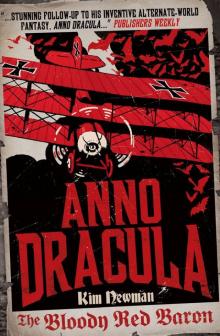 The Bloody Red Baron
The Bloody Red Baron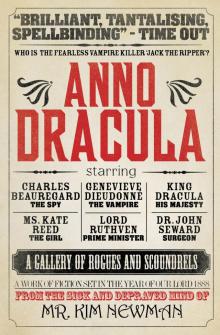 Anno Dracula
Anno Dracula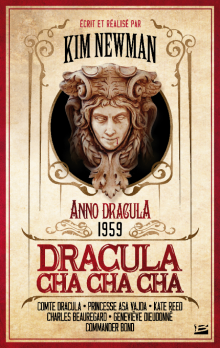 Dracula Cha Cha Cha
Dracula Cha Cha Cha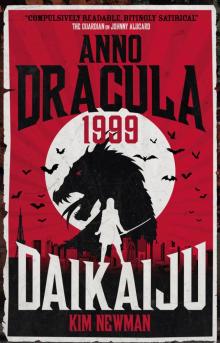 Anno Dracula 1999
Anno Dracula 1999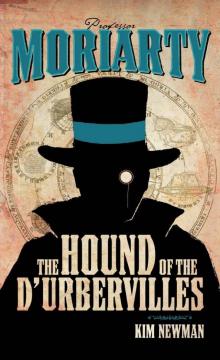 Moriarty: The Hound of the D'Urbervilles
Moriarty: The Hound of the D'Urbervilles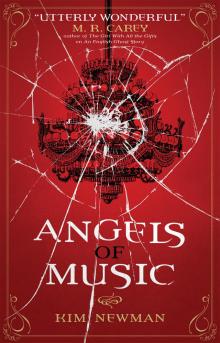 Angels of Music
Angels of Music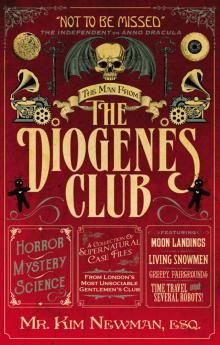 The Man From the Diogenes Club
The Man From the Diogenes Club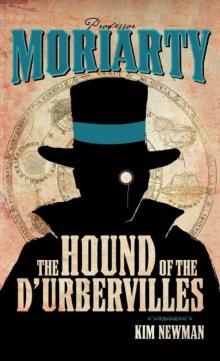 Professor Moriarty: The Hound Of The D’urbervilles
Professor Moriarty: The Hound Of The D’urbervilles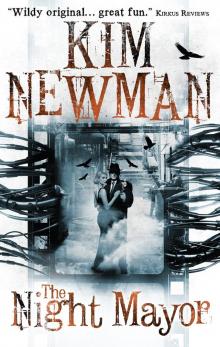 The Night Mayor
The Night Mayor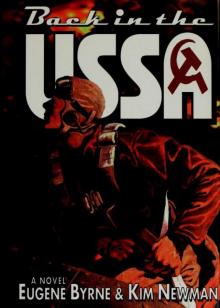 Back in the USSA
Back in the USSA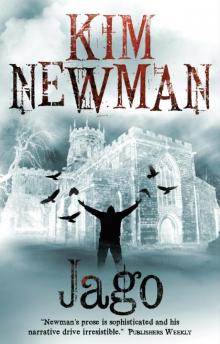 Jago
Jago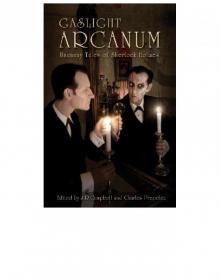 Gaslight Arcanum: Uncanny Tales of Sherlock Holmes
Gaslight Arcanum: Uncanny Tales of Sherlock Holmes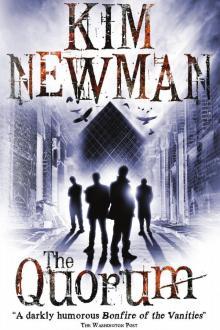 The Quorum
The Quorum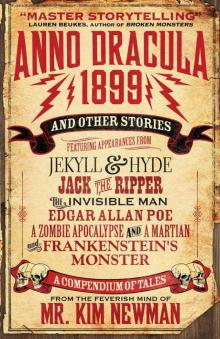 Anno Dracula 1899 and Other Stories
Anno Dracula 1899 and Other Stories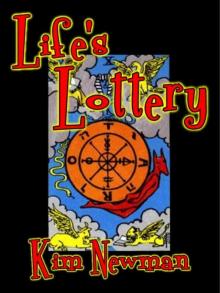 Life's Lottery
Life's Lottery The Secrets of Drearcliff Grange School
The Secrets of Drearcliff Grange School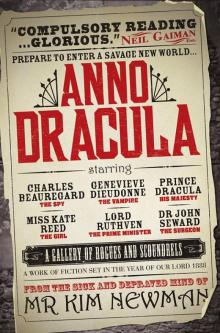 Anno Dracula ad-1
Anno Dracula ad-1 The Bloody Red Baron: 1918 ad-2
The Bloody Red Baron: 1918 ad-2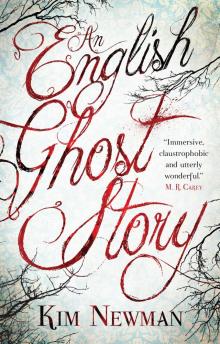 An English Ghost Story
An English Ghost Story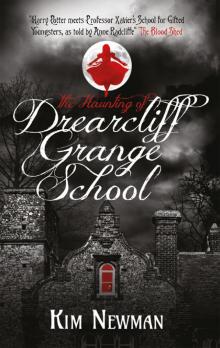 The Haunting of Drearcliff Grange School
The Haunting of Drearcliff Grange School The Other Side of Midnight
The Other Side of Midnight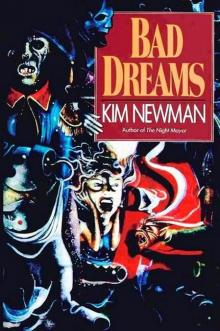 Bad Dreams
Bad Dreams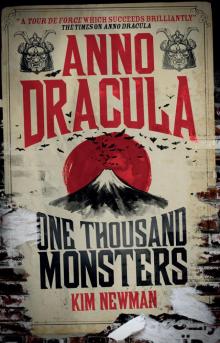 Anno Dracula--One Thousand Monsters
Anno Dracula--One Thousand Monsters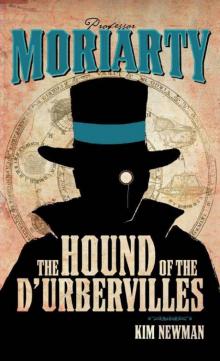 The Hound Of The D’urbervilles
The Hound Of The D’urbervilles The Bloody Red Baron: Anno Dracula 1918
The Bloody Red Baron: Anno Dracula 1918